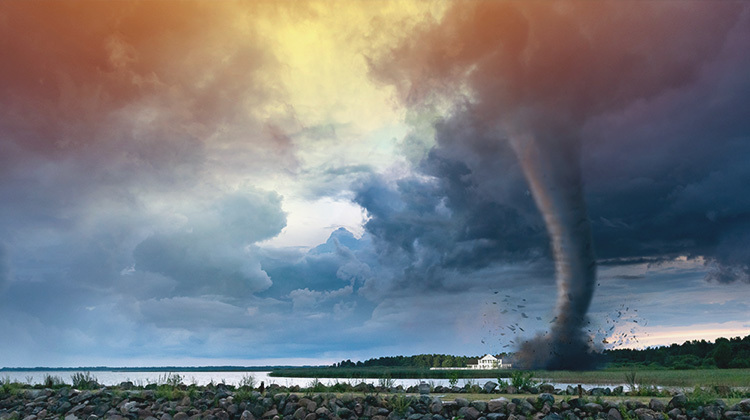In the past 3,400 years, the world has been at peace less than ten percent of the time—about 268 years total. It would be easy to point the finger at Almighty God, but the problem lies in the human heart. Although God has the power to prevent bad things from happening, He created us with the ability to choose right from wrong. It is our own choices that have led to heartache and destruction.
1. The Spiritual Origins of Suffering
2. The Spiritual Origins of Climate Change
3. The "Futility" of Climate Change
4. The Spiritual Solution to Suffering and Climate Change
The Spiritual Origins of Suffering
We can trace the origins of suffering back to Adam and Eve. Their sin in the Garden of Eden destroyed the perfect harmony God established between Himself, humanity, and creation. After eating the forbidden fruit, the couple knew they could no longer stand in God’s presence unashamed. So, they attempted to hide from Him and shift the blame. The cancer of sin spread quickly, leading to the world’s first murder in the next generation (Genesis 4:8).
The situation has not improved. Mankind’s propensity and ability to harm one another have increased exponentially. According to the Union of Concerned Scientists, at least nine countries possess nuclear weapons. Each nuclear-armed submarine in the U.S. Navy has seven times the destructive power of all the bombs dropped during World War II. Some scholars believe Jesus’ prophecy in Matthew 24:6-7 points to another world war. With nearly all the major nuclear powers actively working to increase their nuclear capabilities, this interpretation seems probable.
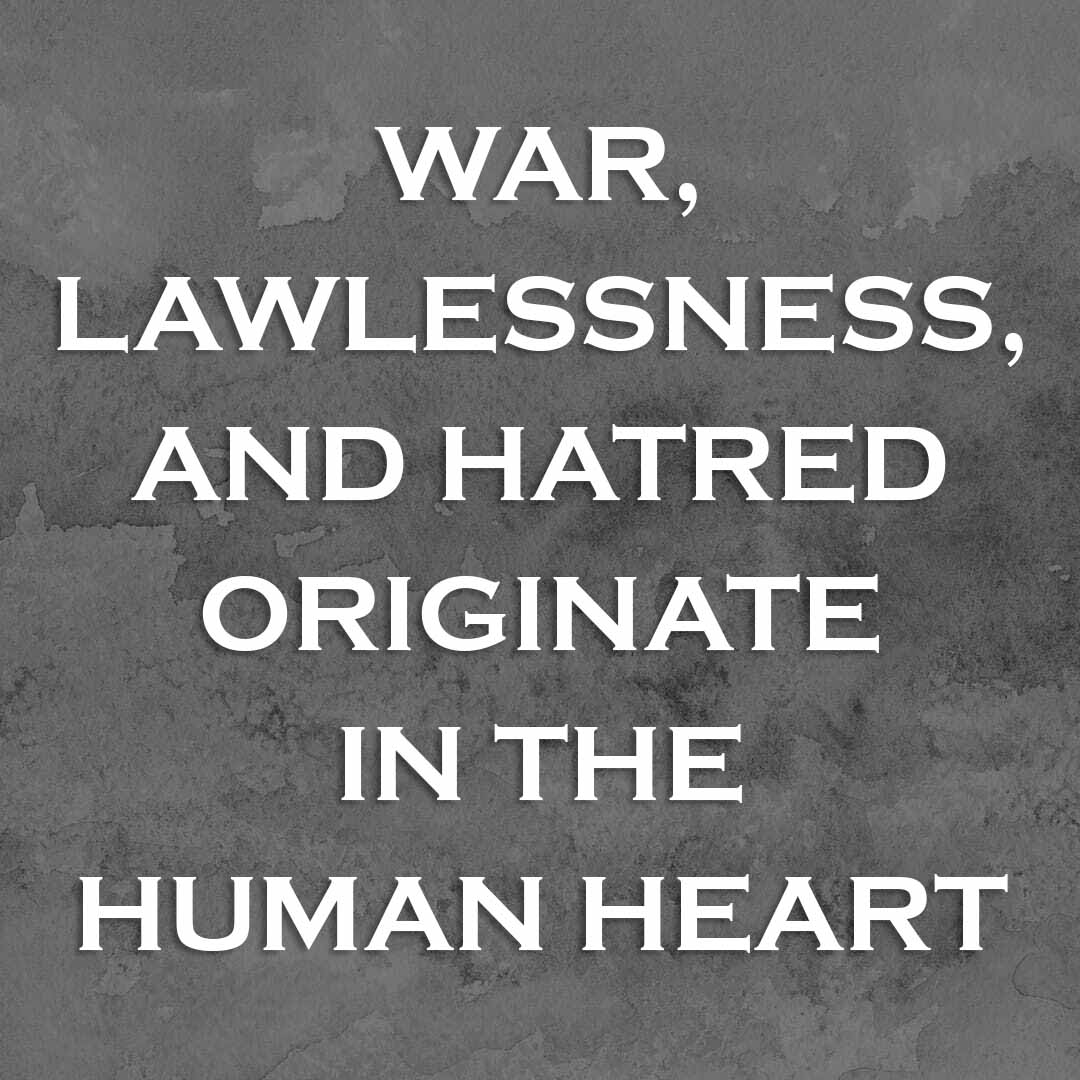
As the effects of original sin continue to ripple outward with increasing intensity and frequency, the problem remains the same. War, lawlessness, and hatred originate in the human heart, largely as a by-product of greed. From our earliest days, we fight a battle against our fallen nature that longs for what we do not have.
Recommended Reading: “Should Christians Be Doomsday Preppers?”
The Spiritual Origins of Climate Change
Even the earth cannot escape sin’s tyranny. In Genesis 3:17-18, God told Adam, “Cursed is the ground for your sake; in toil you shall eat of it all the days of your life. Both thorns and thistles it shall bring forth for you, and you shall eat the herb of the field.”
Whatever you may believe about the effect of technological developments on climate change, we have it on the authority of the Word of God that original sin abruptly changed the world’s climate. Humanity’s fall transformed the earth from a heavenly paradise to a hostile wilderness. The roses grew thorns, and many animals became predators, consuming each other’s flesh.
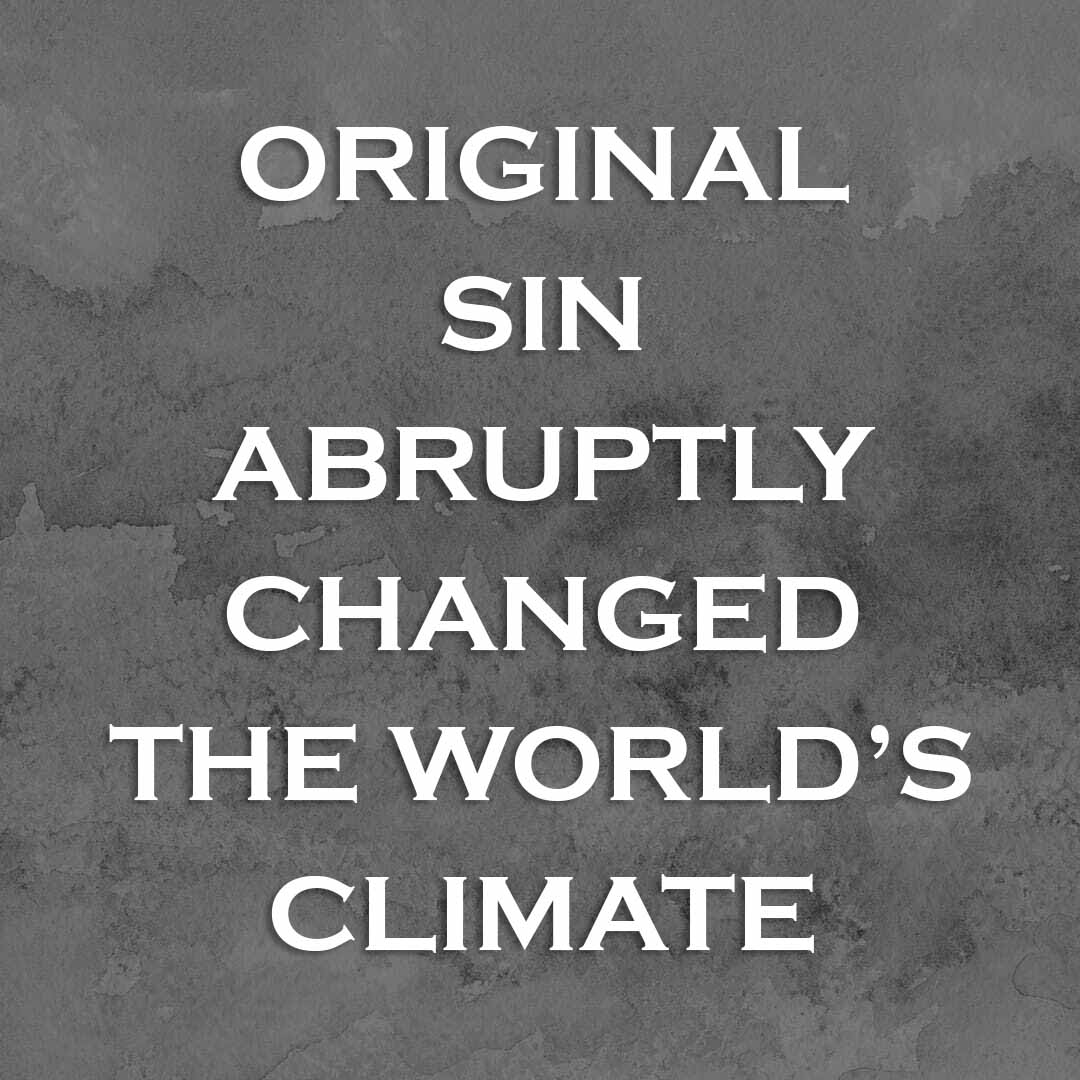
The apostle Paul described the effects of climate change this way: “For the creation was subjected to futility, not willingly, but because of him who subjected it, in hope that the creation itself will be set free from its bondage to corruption and obtain the freedom of the glory of the children of God. For we know that the whole creation has been groaning together in the pains of childbirth until now. And not only the creation, but we ourselves, who have the firstfruits of the Spirit, groan inwardly as we wait eagerly for adoption as sons, the redemption of our bodies. For in this hope we were saved.” (Romans 8:20-24, ESV).
The “Futility” of Climate Change
When Paul says “all creation” groans, this includes animals, trees, mountains, rivers, plains, and heavenly bodies. The world we live in wails in anguish as it awaits the day Christ returns to rule and reign in the Millennium. Scripture gives us a glimpse of the peace creation will enjoy in the Millennium—our return to Eden: “The wolf shall dwell with the lamb, and the leopard shall lie down with the young goat, and the calf and the lion and the fattened calf together; and a little child shall lead them. The cow and the bear shall graze; their young shall lie down together; and the lion shall eat straw like the ox. The nursing child shall play over the hole of the cobra, and the weaned child shall put his hand on the adder’s den. They shall not hurt or destroy in all my holy mountain; for the earth shall be full of the knowledge of the Lord as the waters cover the sea” (Isaiah 11:6-9, ESV).
Recommended Reading: “What Is the Millennium? 7 Answers to 7 Questions”
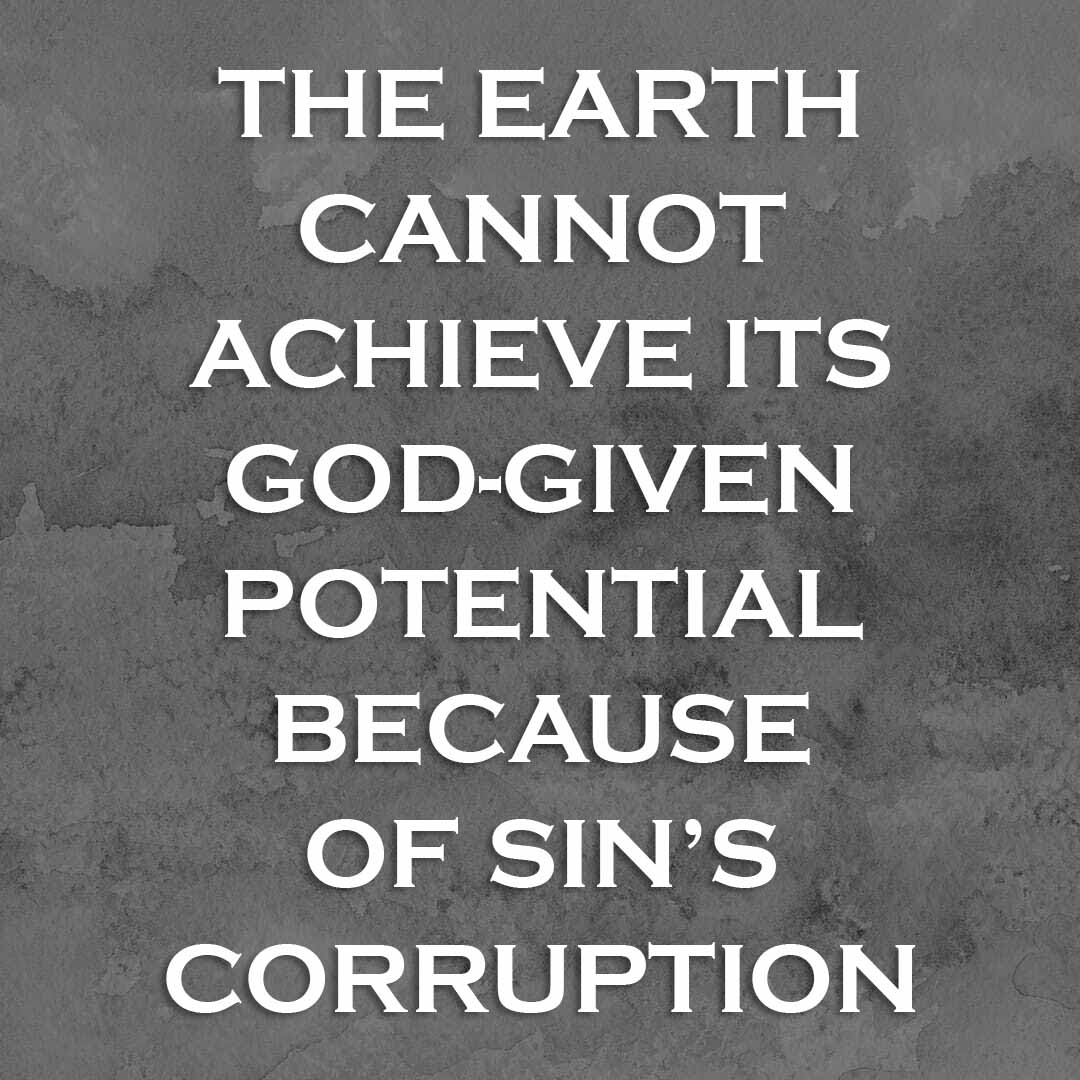
Until then, we live in a world that Paul describes as being subject to futility (Romans 8:20). Futility means “the lack of ability to fulfill the purpose for which something was created.” Today, the earth cannot achieve its God-given potential because of the dramatic climate change brought by sin’s corruption.
We don’t have to look far to find the principle of futility at work in our world. Vast swaths of parched land lie buried in sand and badlands. With alarming frequency, torrential storms, hurricanes, tornadoes, and earthquakes rock our collective sense of security. As if that weren’t enough, USAID reports, “The combined effects of Russia’s war on Ukraine, the COVID-19 pandemic, long-term complex emergencies, and multiseason droughts and other effects of climate change have pushed the world into a global food security crisis.”
The Spiritual Solution to Suffering and Climate Change
Our world will continue to splinter as history hurtles toward the End Times. We cannot prevent bad things from happening, but we can change ourselves. While it would be tempting to respond with anger, despair, or apathy in the face of such futility, God calls us to stand firm in our convictions. There are many facets to faithful Christian living but let me recommend five practical principles for facing all the bad things that go along with living in the world of the end.
Stay calm.
Even as Jesus predicted “wars and rumors of wars,” He told His disciples, “See that you are not troubled; for all these things must come to pass, but the end is not yet” (Matthew 24:6). The tragedies rocking our world grieve Almighty God, but they do not surprise Him. Ours is a God who raises up nations and rulers—and brings them low—according to His perfect plan for our lives and our world. The Bible encourages us, “Be anxious for nothing, but in everything by prayer and supplication, with thanksgiving, let your requests be made known to God; and the peace of God, which surpasses all understanding, will guard your hearts and minds through Christ Jesus.” (Philippians 4:6-7).
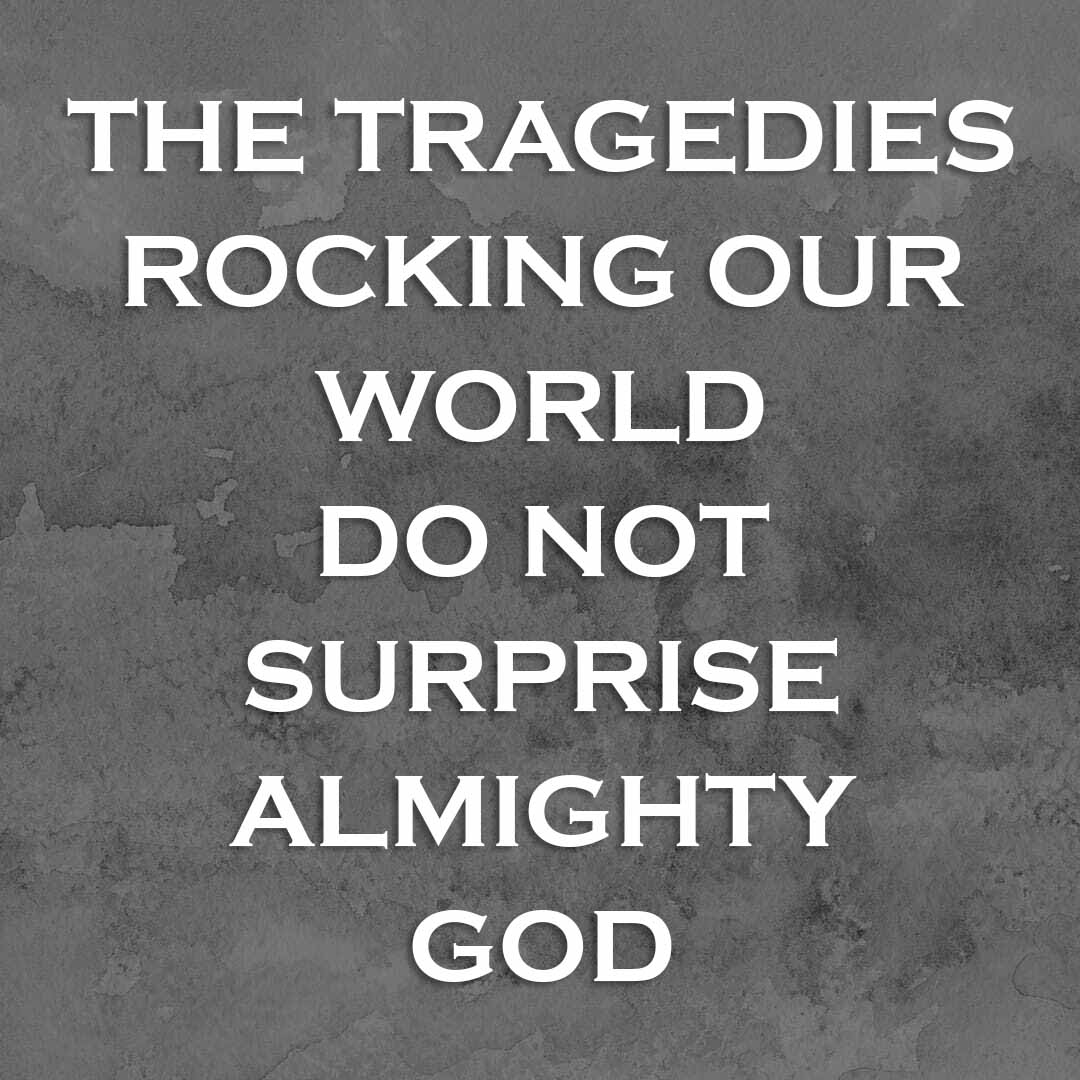
Recommended Reading: “Life Lessons From Deborah in the Bible”
Trust God.
The pain of our circumstances never exceeds God’s power or faithfulness. Psalm 46:8-9 says, “Come, behold the works of the Lord, who has made desolations in the earth. He makes wars cease to the end of the earth; He breaks the bow and cuts the spear in two; He burns the chariot in the fire.” God has appointed an end date for the reign of sin and suffering. If we know Jesus Christ as our Savior and Lord, we can be completely confident that our future is utterly and joyously assured. In the words of the apostle Paul, “For I know whom I have believed and am persuaded that He is able to keep what I have committed to Him until that Day” (2 Timothy 1:12). Being confident in troubled times isn’t about having everything figured out; it’s about trusting the One who has everything figured out.
Give generously.
For many, the recent pandemic resulted in unprecedented scarcity. Empty store shelves spurred shoppers to stockpile essential supplies, fearing they would not be available when needed. While it’s sensible to prepare for emergencies, it’s biblical to be generous. Jesus said, “Give, and it will be given to you: good measure, pressed down, shaken together, and running over will be put into your bosom. For with the same measure that you use, it will be measured back to you” (Luke 6:38). And the apostle John wrote, “But whoever has this world’s goods, and sees his brother in need, and shuts up his heart from him, how does the love of God abide in him? My little children, let us not love in word or in tongue, but in deed and in truth” (1 John 3:17-18). People are hungry in our world today, but we can feed them. People are sick, but we can minister to them. This is not a time for Christians to cling to our possessions. In the world of the end, we can choose to be the people God wants us to be.
Recommended Reading: “What Is Godliness?”
Be thankful.
Trusting God and giving generously are difficult when we get bogged down in a scarcity mentality. We can prepare our heart for living in troubled times by focusing on all the ways God has provided for us in the past. Scripture tells us, “Rejoice always, pray without ceasing, in everything give thanks; for this is the will of God in Christ Jesus for you” (1 Thessalonians 5:16-18). This passage does not say we have to be thankful for everything but in everything. No matter where we find ourselves in life, we can reshape our view of the present by reviewing what God has done for us in the past. And when we adopt an attitude of gratitude, it changes our heart. We begin to see God’s goodness and our ability to minister to those around us.
Keep the faith.
On October 7, 2016, the Turkish government imprisoned American Pastor Andrew Brunson on charges of “support of a terrorist organization” and “political or military espionage.” He spent 735 days imprisoned in the New Testament city of Smyrna under deplorable conditions. Pastor Brunson struggled to persevere during his ordeal, but the Lord did not forsake him. He reported, “Each day I focused on fighting through my fear to reach a place where I surrendered myself to whatever God had for me.”1 Now, he senses an urgency to prepare the global Church for increasing persecution. “I believe the pressures that we’re seeing in our country now are going to increase, and one of these pressures is going to be hostility toward people who embrace Jesus Christ and his teaching, who are not ashamed to stand for him…. My concern is that we’re not ready for this pressure. And not being prepared is very, very dangerous on a number of levels.”2
Recommended Reading: “Bible Prophecy and the Current Political Divide”
Following Jesus has always carried a cost. When Paul wrote the letter known as 2 Timothy, he knew he didn’t have long to live. Tradition and substantial empirical evidence suggest that Paul penned his epistle from Rome’s Mamertine Prison or somewhere similar—a dungeon in a former well located a dozen feet below ground. Facing the end of his earthly journey, Paul had no regrets. “The time of my departure is at hand. I have fought the good fight, I have finished the race, I have kept the faith. Finally, there is laid up for me the crown of righteousness, which the Lord, the righteous Judge, will give to me on that Day, and not to me only but also to all who have loved His appearing” (2 Timothy 4:6-8).
Do you love the Lord’s appearing? Living for the Lord involves sacrifice, labor, and danger. Those eager for Christ’s return persevere because they know their final salvation and righteousness are sure. As we see bad things happening all around us and to us, Christians don’t have to be afraid because we know the One who is in charge. The Lord is on His throne, and one day He will return to right every wrong.

Jesus’ prophecy in Matthew 24 tells us about some of the bad things that will happen in the world of the end, but even more than that, it tells us what kind of people He wants us to be in troubled times. Instead of joining in the hatred and bickering, He wants us to shine the light of His love and grace. The end of the world is closer now than when we first believed. Let us stand firm to the end, knowing Christ has claimed victory.
Sources:
1Andrew Brunson with Craig Borlase, God’s Hostage (Grand Rapids: Baker, 2019), 79.
2“‘Hostility Toward People Who Embrace Jesus Christ’: Pastor Brunson Predicts Intensified Persecution of US Christians,” CBN News, December 10, 2020, https://www1.cbn.com/cbnnews/us/2020/december/hostility-toward-people- who-embrace-jesus-christ-pastor-brunson-predicts-intensified-persecution-of-us-christians.
